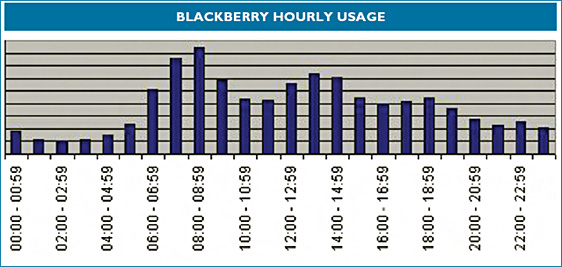
 |
Email for the masses seems to be ready, but there is one thing getting in the way; the end user. Here, Alex Windle, head of email and applications at for Vodafone UK, takes a look at what is stopping the instant adoption of this seemingly killer application for mobile.
What can we expect from the world of work in 2018? According to a recent report by the Chartered Management Institute, we should all be preparing for some potential surprise scenarios, including the use of holograms for communication, the control of employee behaviour with microchips, robots in management positions and corporations that are more powerful than governments.
Admittedly, the Institute has sugared the pill with the caveat that these are only possibilities that managers and businesses should be thinking about and preparing for. But this future world of business, driven almost wholly by technology, still sounds somewhat scary and Orwellian. With predictions like this it is perhaps not surprising that new technology, especially to those in the more non-technical areas of the small business sector, is often intimidating to some degree, or at least off-putting.
At Vodafone we were recently reminded of this when we conducted a series
of focus groups with small businesses to discuss their options for embracing mobile working. With almost half the group, we were confronted with barriers aplenty, including: “I don’t want to leave my comfort zone”, “I already find my mobile too complicated”, “It’s not worth the intrusion” and “I don’t want to invest the time”. Every reason to resist was aired, from security to usability and even image.
What were we discussing? Mobile hologram players perhaps? GPS enabled brain-implants? Depressingly, it was nothing quite so ‘futurologist’. What we were discussing, in fact, was mobile email.
The future, today
For us at Vodafone this is frustrating. Mobile email is readily available to most, and if a few preconceptions were broken, it could be adopted a lot more widely by British business.
It is not as if email itself has not been around for a long time. The first email was sent in 1971. It has become part of the business furniture, and there cannot be too many people left who have earned a wage in the past 10 years and have not come across it at some point. Mobile email is also getting a little bit long in the tooth; at Vodafone we launched our first Blackberry service back in 2003 and have added a complete range of other, complementary mobile email services since.
So why has mobile email not yet been more widely adopted?
The problem thus far, perhaps, has been one of perception. BlackBerry, in its early days, started as a system that required a reasonably large up-front investment, so it only really made financial sense to larger companies. The result has been that for too long now there has been an assumption that mobile email is the exclusive preserve of corporate high flyers.
For others, especially small businesses, mobile email is still mostly considered to be part of a faraway future, something that will be made available to them some way down the line; something that they know they will have to deal with one day but for now are happy to continue managing with what they’ve got, which in most cases is no mobile email at all.
We believe that these perceptions are mistaken. Consider the trajectory of the mobile phone itself. It evolved from being a luxury item in the eighties, to a casual item in the mid-nineties, to one that has become indispensable since 2000.
This is exactly what is happening currently to mobile email. Far from being a CEO’s toy, the use of mobile email is not only spreading across companies where BlackBerry is already ingrained, it is also available, affordable, and for use by pretty much anybody that has bought a new phone in the last year.
Does that sound surprising, or even an overstatement? Well, at the last estimate, mobile email was available on 99% of the handsets in the Vodafone range. This means, at the very least, that the vast majority of people running a web-based email address, such as Google Mail or Yahoo! Mail as many small companies do, can pick up mobile email as part of a mobile internet package.
But what if a business is using a more professional email service on its desktop in the office? Another common misconception is that more advanced ‘always on’ email services, meaning those that ‘push’ business account emails to the handset unprompted, without the need to log on and ‘pull’ the emails down to the handset from a website, are only available to big companies that can afford to install and manage a separate mobile email server within their IT departments. This is also not true, and can easily be addressed by a number small business focused services, such as BlackBerry Internet Server or Vodafone Email Plus, which can push any email account to the handset without the need for anything so complicated as a server, or even an IT manager.
Grabbing ROI
But why do businesses really need mobile email? It’s a fair enough question.
One of the reasons long touted is the recovery of ‘dead time’. Less well explained is what this actually means for a business. As a mobile network operator, we have the advantage of being able tell when mobile email is being used, and therefore when it becomes most valuable, by measuring the volume of traffic passing across our network at different times of the day. Our analysis shows that the peak hours are between 6am and 9am, and 12pm and 3pm. It doesn’t take a genius to work out that these are hours of the day that were hitherto not noted for their productivity or the value that they can add to a business.
So a business can make its staff more productive, more available and more flexible about how and where they communicate. But to really nail the return on investment question on the head, we conducted some unprecedented research on email, response times and the potential loss to a business for failing to respond. The results were quite startling.
One in three businesses, according to our figures, said that they will take their custom elsewhere if a potential supplier does not respond to an email enquiry in just two hours, while one in ten expect a response in just 30 minutes. And the average penalty for being late? The owners and managers that we asked said that the average cost to their business was £18,840. If that’s not a good reason for adopting mobile email, then I don’t know what is.
Seize the moment
The Chartered Institute of Management has advised us all in business to prepare for a proliferation of companies that operate virtually. This does not necessarily mean that we will hold meetings with holographic projections any time soon, but it does mean that those virtual companies are most likely to be small community-based enterprises without conventional business premises. In these circumstances, mobile email will be a must.
Today, in 2008, businesses are already more mobile and flexible than they have ever been before, while customers and suppliers are consistently raising their levels of expectation as to how they are communicated with. Mobile email, or rather the ability to respond quickly and decisively to customers no matter the location, can make a real difference to the bottom line.
So for ‘virtual’, read flexible, and for flexible, read profitable.
The future can no doubt be intimidating. But losing business today is something to really be frightened of.

